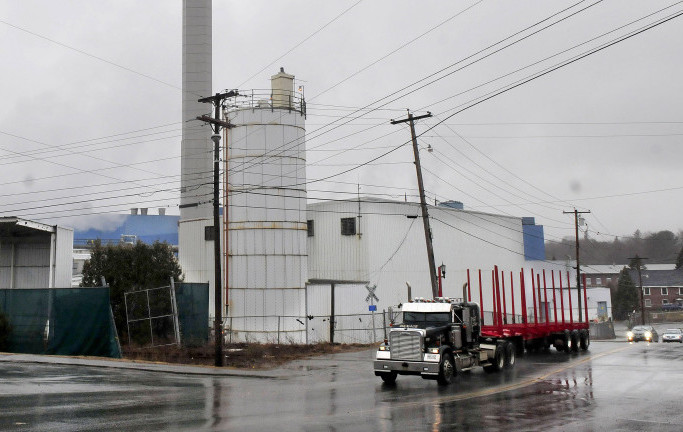MADISON — Town officials say they are optimistic about the possibility of securing additional state education money after meetings earlier this week with Gov. Paul LePage and state lawmakers.
The meetings Tuesday in Augusta followed an announcement earlier this month by Madison Paper Industries, the town’s largest taxpayer and one of the area’s largest employers, that the mill will close in May, laying off about 215 people and having a potentially devastating affect on municipal and school budgets.
Officials on Tuesday discussed emergency legislation that would help Madison and possibly other towns faced with large losses in tax value to have those losses recognized by the state immediately, rather then in the three-year cycle currently used to calculate state education and municipal revenue sharing money.
Madison Town Manager Tim Curtis and School Administrative District 59 Superintendent Todd LeRoy both called the meetings in Augusta productive and said officials discussed passing emergency legislation as early as next week that would give tax relief to Madison.
Adrienne Bennett, press secretary for LePage, also said in an email Tuesday that “the governor is open to all options and has asked several departments to provide suggestions on sound public policy to address this situation and prepare for additional mill closures.”
Bennett said that “no final decision has been reached as to the exact language or the vehicle” by which the state plans to address the situation in Madison, but lawmakers, including Reps. Jeff McCabe, D-Skowhegan, and Brad Farrin, R-Norridgewock, said they are working specifically on amending L.D. 281.
The bill was introduced in the Legislature last year and proposes that the state establish adjustments to tax valuations for mill towns that have seen a large loss in value as they calculate education funding and municipal revenue sharing funds.
The bill builds off the concept of the state’s “sudden and severe” statute, which also provides additional state money to municipalities that have a large drop in tax value, but only if the loss is the result of a business ceasing operations, not a change in assessment.
A community such as Skowhegan, which Tuesday reached a deal with Sappi Fine Paper under which the town will lose about $1.2 million in tax revenue next year, would not be eligible to apply for the sudden and severe funds.
L.D. 281 as written names four towns recently affected by large losses in tax value at paper mills — Jay, Madison, Millinocket and Skowhegan — but McCabe and Farrin said Wednesday that they are looking at amending the bill to include more communities and not just those affected by the paper industry, but any large loss in tax value.
“It sort of picks up where sudden and severe couldn’t help some municipalities,” Madison Town Manager Tim Curtis said.
L.D. 281 was presented in the Legislature last year, but ultimately was tabled after it drew opposition from the Maine Department of Education, which expressed concern that changing education subsidies for communities hit by a loss in tax value would mean a complete redistribution of funding across the state.
Curtis said Wednesday that the legislation is “the best way to help towns that are affected by a huge loss like this, especially to be able to get their state aid for education faster than the three-year rolling average.”
The state Educational Programs and Services model, or EPS, calculates education funding based on a three-year average of property values and student enrollment, designed to help soften the tax blow in districts that see a rise in property values or decline in students.
But in the case of Madison, which saw a loss of $150 million in tax value at its paper mill in 2014, the formula has resulted in a school tax that is calculated based on property value that no longer exists.
The loss at the mill also has affected the town’s municipal budget, with residents deciding to consolidate their local police department with the county sheriff’s department as a cost savings measure last year, and voting to establish a $2.5 million line of credit to get the town through the year.
With an announcement earlier this month that the paper mill will close, officials are worried that they will soon see an additional loss of another $80 million in tax value — the mill’s current worth.
Unlike some other mill closures that have taken place around the state, Madison Paper Industries has not declared bankruptcy and has continued to pay its taxes; but some officials are worried about finding a buyer for the former mill site, should it be put up for sale. The company has announced plans to sell the hydro power plants associated with the mill, and McCabe said Wednesday that he also has submitted a bill that would prevent the separation of the hydro plant and mill property in a sale.
Whether the state would be able to regulate such a sale is unclear, McCabe said, adding that he feels it is a discussion worth having since the state does have some capacity to regulate hydropower facilities. “The reality is that damn could be operated while it’s still associated with the building,” McCabe said. “I don’t want to see a business losing money, but at the same time I want to make sure the town continues to see a benefit through taxation and other things.”
SAD 59, which consists only of Madison, presented residents last year with a flat budget, something that helped keep the tax rate low; but with a $486,000 loss in state funding this year, LeRoy said this week, it will be impossible to make the cuts in the school budget required to keep a flat budget.
He hopes that L.D. 281 will help fund the school budget and offset any additional tax increase that Madison residents might see because of the mill closing.
“People are trying to keep a very strong appearance, but there are a lot of people who are very concerned about being able to make ends meet and do the things they’re used to doing,” LeRoy said. “There certainly aren’t the same number of job opportunities in the area without the mill, so I’m betting there are a lot of people who are very afraid for the future.”
Rachel Ohm — 612-2368
Twitter: @rachel_ohm
Send questions/comments to the editors.





Success. Please wait for the page to reload. If the page does not reload within 5 seconds, please refresh the page.
Enter your email and password to access comments.
Hi, to comment on stories you must . This profile is in addition to your subscription and website login.
Already have a commenting profile? .
Invalid username/password.
Please check your email to confirm and complete your registration.
Only subscribers are eligible to post comments. Please subscribe or login first for digital access. Here’s why.
Use the form below to reset your password. When you've submitted your account email, we will send an email with a reset code.